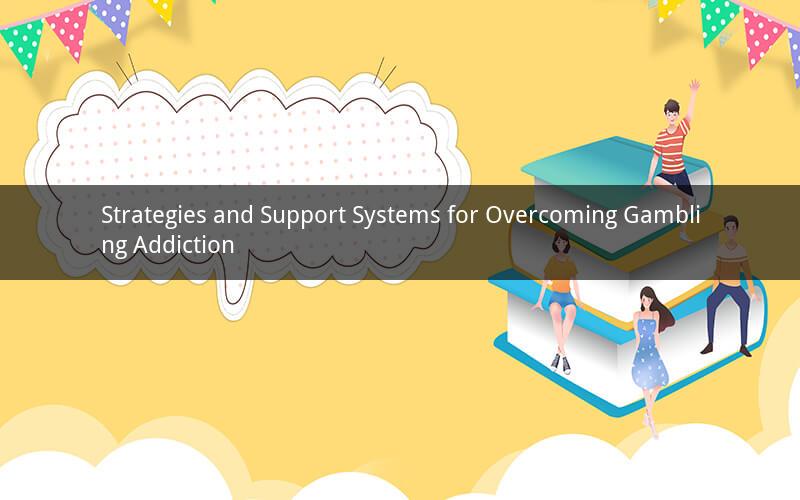
Gambling addiction, also known as compulsive gambling, is a serious issue that affects millions of people worldwide. It can lead to financial, emotional, and social problems, making it crucial for individuals to seek help and recover from this addiction. This article explores various strategies and support systems that can assist individuals in overcoming gambling addiction.
1. Understanding the Nature of Gambling Addiction
Gambling addiction is characterized by an inability to control gambling behavior, despite negative consequences. It is essential to recognize the signs of gambling addiction, such as preoccupation with gambling, lying about gambling activities, and chasing losses. Understanding the nature of gambling addiction is the first step towards recovery.
2. Seeking Professional Help
Professional help is crucial for individuals struggling with gambling addiction. Therapists, counselors, and psychologists can provide personalized treatment plans tailored to the individual's needs. Cognitive-behavioral therapy (CBT) is a widely used treatment method that helps individuals identify and change negative thought patterns associated with gambling.
3. Building a Support Network
A strong support network is vital for overcoming gambling addiction. This network can include family members, friends, and support groups. Sharing experiences and receiving encouragement from others who have faced similar challenges can be incredibly beneficial. Online support groups, such as Gamblers Anonymous, offer a platform for individuals to connect with others and receive guidance.
4. Financial Management
Gambling addiction often leads to financial problems. Learning to manage finances is an essential aspect of recovery. Budgeting, setting limits, and seeking financial counseling can help individuals regain control over their finances. It is crucial to address the root causes of financial difficulties, such as credit card debt or loans, to prevent relapse.
5. Developing Coping Skills
Coping skills are essential for managing triggers and stress that may lead to relapse. Mindfulness, meditation, and relaxation techniques can help individuals stay grounded and focused. Engaging in hobbies, exercise, and other healthy activities can also provide a sense of fulfillment and distract from the urge to gamble.
6. Setting Goals and Celebrating Progress
Setting realistic goals and celebrating progress is an important part of the recovery process. Individuals can set short-term and long-term goals, such as attending support group meetings regularly or avoiding gambling for a specific period. Recognizing and celebrating achievements can boost self-esteem and motivation.
7. Addressing Co-occurring Disorders
Many individuals with gambling addiction also struggle with other mental health issues, such as depression, anxiety, or substance abuse. Addressing these co-occurring disorders is crucial for a comprehensive recovery. Treatment plans should be tailored to address both the gambling addiction and any underlying mental health issues.
8. Creating a Safe Environment
Creating a safe environment is essential for individuals in recovery. This may involve removing gambling-related items from the home, avoiding trigger places, and seeking help from employers or creditors to address any legal or financial issues. A supportive and understanding environment can help individuals stay on track and avoid relapse.
9. Continuing Education and Support
Recovery from gambling addiction is an ongoing process. Continuing education and support are essential for long-term success. Individuals can attend workshops, seminars, and support group meetings to stay informed about the latest research and treatment options. Maintaining a strong support network and seeking professional help when needed can also contribute to a successful recovery.
10. Embracing a New Lifestyle
Embracing a new lifestyle is crucial for individuals in recovery from gambling addiction. This may involve developing new hobbies, forming new friendships, and adopting healthy habits. By focusing on positive aspects of life, individuals can reduce the urge to gamble and build a fulfilling life free from the grip of addiction.
FAQs:
1. What are the signs of gambling addiction?
Gambling addiction can be identified by signs such as preoccupation with gambling, lying about gambling activities, chasing losses, and experiencing negative consequences due to gambling.
2. Can gambling addiction be cured?
While there is no guaranteed cure for gambling addiction, it can be effectively managed through treatment and support.
3. How long does it take to recover from gambling addiction?
The duration of recovery varies for each individual, but many people experience significant improvement within a few months of seeking treatment.
4. Can therapy help with gambling addiction?
Yes, therapy, particularly cognitive-behavioral therapy (CBT), can be highly effective in treating gambling addiction by helping individuals identify and change negative thought patterns.
5. Is it possible to prevent a relapse?
Preventing a relapse requires ongoing effort and commitment. Building a strong support network, developing coping skills, and maintaining a healthy lifestyle can help reduce the risk of relapse.